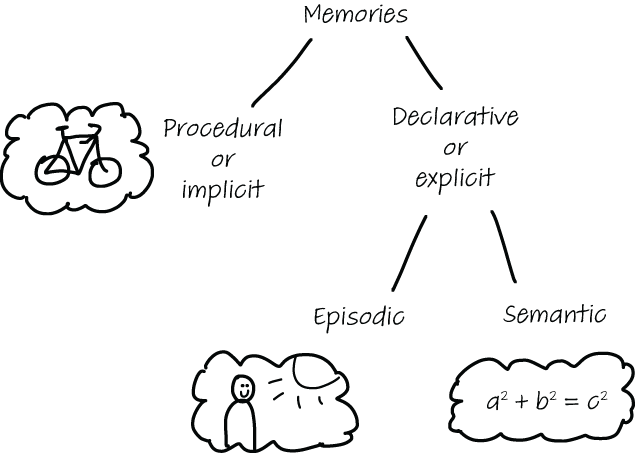總結
第十章先定義了「何謂解決問題」,並提出以下兩點「提升解題能力」的方式:
- 增加相關的內隱記憶(implicit memory)
- 學習他人解決問題的方法
筆記
何謂解決問題
本書認為「解決問題」可以拆解三個步驟:
- 定義起點(start state)
- 定義終點(goal state)
- 在限制條件(rules)內,以最短的路徑(state space)從起點抵達終點
以前端開發來舉例,一個解決問題的流程可能是:
- 為既有的線上服務(起點)新增一種付費方式(終點)
- 使用 TypeScript 開發、並且既有的所有單元測試都要維持綠燈(限制條件)
- 避免不必要的重造輪子(最短路徑)
解題時的心智活動
解決問題時,我們會根據該問題的特徵,從長期記憶中搜索對應的內容(以便解決眼下的問題)。問題的特徵越明顯,回想的難度就會比較低。大腦比較擅長處理它曾經解決過的問題。
…while thinking about a problem, the brain retrieves information from the LTM, which could be relevant to the problem at hand. … It is easier for your brain to solve familiar problems.
記憶的類型
記憶有內隱記憶(implicit memory)與外顯記憶(explicit memory)兩大類。而外顯記憶又能分成情景記憶( episodic memory)和語意記憶(semantic memory)

內隱記憶比如打領帶、綁鞋帶,以程式開發來說,能進行「鍵盤盲打」就是一種內隱記憶。
情景記憶則是「我記得某年夏天去了某處玩」這類記憶。以程式開發來說,就是你記得「你曾經解過類似的問題」。本書就提出「專家通常是將舊問題的解決方式改編為新問題的解方」,而不是一味的從零開始解題:
In a sense, experts recreate, rather than solve, familiar problems. That means that instead of finding a new solution, they rely on solutions that have previously worked for similar problems.
作者也提到「除錯時的靈光一閃」乍看是一種直覺,但可能只是你想起來過去處理過類似的問題,並且當時問題是發生在什麼地方:
Sometimes what we call intuition, in fact, happens when you solve a problem similar to one you have solved before; you just know what to do without really knowing how to do it.
語意記憶(以程式開發來說)是關於迴圈語法的記憶、或是知道如何宣告變數等。可以靠背誦來強化的,都算是這類記憶。
提升解題能力的方式
第一種方式:增加相關的內隱記憶(肌肉記憶)。
人可以在散步的同時聊天,或是邊看電視邊打毛線。能做到前面這些事情,是因為「散步」與「打毛線」已經成為內隱記憶,不需要消耗太多認知負荷(cognitive load)就能執行。開車時滑手機之所以危險,是因為開車不只依靠肌肉記憶。
The interesting thing about implicit memories is that when you have trained implicit memories well enough, it takes your brain hardly any energy to use them.
以程式開發來說,如果你能毫不費力地理解 JavaScript 陣列的語法糖(map/sort/reduce)在做什麼、或是正規表達式要比對的字串內容,這就代表你的大腦比「不能直接理解的人」有更多的餘裕可以專注在「解決問題」上。
故本書認為「增加內隱記憶」是一種能夠提升解題能力的方式。
…cognitive load indicates how busy or full your brain is. When you experience too much cognitive load, thinking can become really hard. The more implicit memories you have for programming, the easier it will be to solve larger problems because you will have more cognitive load to spare.
訓練內隱記憶主要靠「重複」。舉例:如果你對 JavaScript 的 Array.reduce() 還不熟悉,書中建議可以透過練習各種 .reduce() 組合來強化相關記憶。比如 .reduce() 不同種類的陣列、或是要將同一個陣列透過 .reduce() 輸出成各式內容。
第二種方式:學習他人解決問題的方法
本書第四章曾提過「認知負荷有三種類型」(可參考此篇筆記)。而「學習解決問題的方式」就是為了減低一個問題帶來的密切認知負荷(germane load)。
當我們在沒有其他幫助下試圖解決一個非常困難的問題時,我們會耗費所有的能量在「解決問題」上。但因為解決這個問題的認知負荷實在太大,所以我們根本沒有餘裕「記住我們今天究竟如何解決問題」。
When all the cognitive load you have room for is filled with intrinsic and extraneous load, there is no room left for germane load; in other words, you cannot remember the problems you have solved and their solutions.
而此章上半部也提過,人類在解決問題時,需要依賴長期記憶中的線索來幫解眼下的問題。如果解決了一個問題卻記不住它,今天的解決就無法成為未來的助力。
但若在你試圖解決一個問題時,你能參考其他人的解法(有一個樣本可以看著改),這就能讓大腦有餘裕可以「記住今天你是如何解決某個問題」。日後再遇到類似的狀況,你就能透過回想來解決新遇到的問題。
參考別人的解法並不可恥,且能夠幫助自己未來解決更多問題 =͟͟͞͞( •̀д•́)!